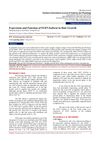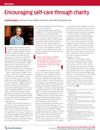 16 citations,
January 2007 in “Journal of Obstetrics and Gynaecology”
16 citations,
January 2007 in “Journal of Obstetrics and Gynaecology” The document suggests various treatments for PCOS, including medication for menstrual issues, insulin resistance, and excess hair, as well as fertility treatments, while highlighting the need for personalized care and lifestyle changes.
16 citations,
September 2004 in “Pediatric dermatology” Children and adolescents with allergies tend to have longer eyelashes.
5 citations,
July 2018 in “Skin appendage disorders” Sunscreen spray on the scalp may be linked to a type of scarring hair loss.
 2 citations,
December 2021 in “Journal of Veterinary Medical Science”
2 citations,
December 2021 in “Journal of Veterinary Medical Science” Lokivetmab reduced itching in a dog with skin lymphoma.
2 citations,
March 2020 in “Developmental cell” Stress can cause hair to turn gray by depleting pigment-producing cells through the release of a stress hormone.
2 citations,
August 2014 in “Journal of the American Academy of Dermatology” A rare case of scleredema in a diabetic woman showed loss of sweat glands, causing heat strokes, with treatment only slightly improving symptoms.
 1 citations,
March 2023 in “PloS one”
1 citations,
March 2023 in “PloS one” Different amounts of daylight affect cashmere growth in goats by changing the activity of certain genes and molecules.
 1 citations,
February 2021 in “Scholars international journal of anatomy and physiology”
1 citations,
February 2021 in “Scholars international journal of anatomy and physiology” Different forms of FGF5 either promote or inhibit hair growth.
 1 citations,
March 2020 in “Poster presentations”
1 citations,
March 2020 in “Poster presentations” SLE patients need careful diagnosis to distinguish infections from disease flares for proper treatment.
 November 2017 in “British journal of nursing”
November 2017 in “British journal of nursing” Charities help patients manage their own health by providing resources and support.
 May 2017 in “Journal of The American Academy of Dermatology”
May 2017 in “Journal of The American Academy of Dermatology” Certain factors like patchy hair loss at the back of the head, being female, and younger age at diagnosis can lead to a worse outcome for alopecia areata.
 January 2017 in “Journal of cosmetology & trichology”
January 2017 in “Journal of cosmetology & trichology” A man with severe hair loss regrew hair after hormone treatment.
 January 2013 in “Springer eBooks”
January 2013 in “Springer eBooks” Hair care products are important for appearance and self-esteem, and choosing the right ones can help maintain healthy hair.
December 2005 in “Dermatologic surgery” Er:YAG laser therapy is ineffective for treating facial eruptive vellus hair cysts due to early recurrence and side effects.
 January 2021 in “Journal of cosmetology & trichology”
January 2021 in “Journal of cosmetology & trichology” The treatment improved hair growth and thickness in patients with hair loss, even 10 months after therapy without additional products.
 February 2017 in “The Journal of Sexual Medicine”
February 2017 in “The Journal of Sexual Medicine” Finasteride for hair loss can cause erectile dysfunction due to tissue fibrosis.
 213 citations,
December 2020 in “Annals of internal medicine”
213 citations,
December 2020 in “Annals of internal medicine” Many COVID-19 patients still have symptoms like fatigue and loss of taste or smell a month after diagnosis.
 160 citations,
April 2012 in “Journal of Cellular and Molecular Medicine”
160 citations,
April 2012 in “Journal of Cellular and Molecular Medicine” Telocytes might help with skin repair and regeneration.
 152 citations,
October 2010 in “Archives of Dermatology”
152 citations,
October 2010 in “Archives of Dermatology” Finasteride helps hair growth but may cause sexual side effects.
 95 citations,
December 1980 in “The New England Journal of Medicine”
95 citations,
December 1980 in “The New England Journal of Medicine” Minoxidil helped bald patient regrow hair.
85 citations,
January 2002 in “Dermatologic Clinics” Lasers and intense pulsed light can safely and effectively remove hair by targeting hair follicles.
 80 citations,
February 2021 in “Cureus”
80 citations,
February 2021 in “Cureus” Many COVID-19 survivors continue to experience symptoms like fatigue and concentration problems after recovery, possibly needing rehabilitation.
79 citations,
January 2000 in “Annals of Clinical Psychiatry” Some psychiatric medications can cause hair loss, but stopping or reducing the dose usually reverses it.
 73 citations,
July 2013 in “The Journal of Sexual Medicine”
73 citations,
July 2013 in “The Journal of Sexual Medicine” Finasteride use changes brain chemicals, causing lasting sexual issues and anxiety/depression.
 71 citations,
November 2013 in “Clinics in Dermatology”
71 citations,
November 2013 in “Clinics in Dermatology” Acne is a chronic disease linked to various systemic conditions and has significant psychological and social effects.
 70 citations,
August 1995 in “Fertility and Sterility”
70 citations,
August 1995 in “Fertility and Sterility” Finasteride reduces hairiness and androgen levels in women with unexplained excessive hair growth.
 63 citations,
March 2000 in “Annals of clinical psychiatry”
63 citations,
March 2000 in “Annals of clinical psychiatry” Some psychiatric medications can cause hair loss, but it usually grows back after adjusting the medication.
 61 citations,
December 2016 in “The EMBO Journal”
61 citations,
December 2016 in “The EMBO Journal” The study showed that hair follicle stem cells can maintain and organize themselves in a lab setting, keeping their ability to renew and form hair and skin.
 61 citations,
April 2014 in “The Journal of Steroid Biochemistry and Molecular Biology”
61 citations,
April 2014 in “The Journal of Steroid Biochemistry and Molecular Biology” Finasteride affects brain and blood steroids, causing lasting sexual and emotional side effects.
 56 citations,
January 2019 in “Lancet”
56 citations,
January 2019 in “Lancet” JAK inhibitors help regrow hair in alopecia areata patients, improving their quality of life.






















